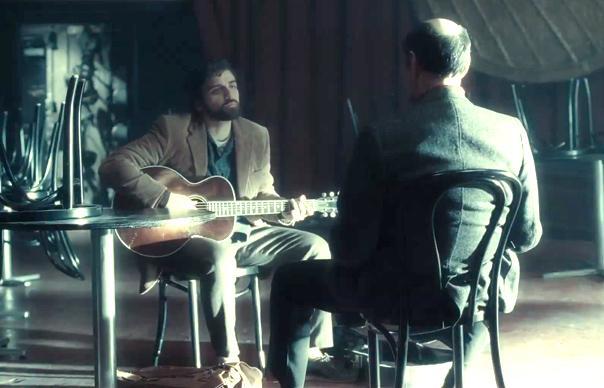
As you’d expect from a Coen brothers film, Inside Llewyn Davis is populated with its share of wonderful, often grotesque supporting characters. Chief among these is John Goodman’s jazz musician, Roland Turner, who holds venomous opinions of Llewyn and the folk music scene. “John is larger than life,” explains Ethan. “He’s like John Cleese. He’s angry but it’s always funny.”
“He brings a lot of independent vigor,” adds Joel. “We’ll be in the middle of writing something and then somebody you know who’s an actor takes over the voice of the character. As we were writing this, it became evident that this would be something really interesting to see John play, and then that feeds into how the character develops.”
“John – is he a normal person or a dangerous madman?” reflects Ethan. “When he arrives, there will be colour. And things will get bad.”
In fact, Inside Llewyn Davis is Goodman’s first film for the Coens since O Brother, Where Art Thou?. “It’s been fifteen years,” Goodman confirms. “What did I do to piss them off?”
With his return to the fold, Goodman can now claim to the longest standing member of the Coens stock company.
“I remember the first time I met them,” he explains. “I went in for Raising Arizona, and they told me that they had directed Blood Simple. I watched that and I was immediately impressed with their film. How literary it was. How they made things work on an obviously independent budget. Very creative. A lot of hard-boiled Raymond Chandler, Dashiel Hammett type stuff, with great imagery. So I walked in for the audition. They’d given me scenes to read. I don’t believe I’d seen the whole script yet, but the scenes were hysterical. I wanted it badly. But as soon as I walked in, we were laughing so hard about all kinds of stuff that seemed like I’d know them or grown up with them. This is very presumptuous to say, but it was a good, comfortable feeling.”
How would Goodman sum up working with the Coens?
“Fortunate,” he considers. “Right place right time. Similar mid-west wise guy sensibilities. Similar interests. I mean, when we did O Brother…, I was always interested in that music and this stuff I like as well. There’s got to be a common thread there somewhere. Maybe, we’re both from the same area of this country at the same time.”
How has their working relationship changed over the years?
“I don’t know that it has,” Goodman says. “Here, it was like coming home again. There was a role that they had written for me after, after Oh Brother, Where Art Thou?, but the names of the character were almost identical. The characters were getting to be too much of the same guy. So they went for somebody else. I understood that. But, yeah it’s… I’m still there on opening day whenever they release a film. I just love what they do.”
What about Roland Turner? Thinking about Ethan’s quote – “things will get bad” – they certainly take a turn for the worst when Turner arrives. “Yeah,” he laughs. “I was thinking a little while ago that maybe Roland really likes Llewyn and he’s just that way with everyone you gotta get used to him. He’s just toxic. Yeah, he might have even taken an interest in him.”
Although Goodman cites Charlie Meadows from Barton Fink and The Big Lobowski’s Walter Sobchak as his favourites among the five characters he’s played for the Coens so far, he appears to be developing a fondness for Turner. “Roland may appear weird and far out to some people, and to Llewyn. But to me, Roland seems like a normal guy,” says Goodman. “Coens characters are like all human beings you meet, they’re just stretched a little. I thought a lot about the guy before we began and I assumed he was a jazz pianist. But when I went to the read-through with Joel and Ethan, Joel said, ‘No, he’s a trumpet player.’ But Ethan goes, ‘Oh, no, he’s a reed man—I see him playing the saxophone.’ So he’s a little bit of all three.”
But Roland Turner represents a certain type of jazz musician, as his outward appearance – his marvelous maroon suit, Caesar haircut, fedora and walking canes – attests.
“The hair was my idea,” says Goodman. “I wanted it to look like Gerry Mulligan. It didn’t work out, I looked more like Moe Howard. But I thought, he’s a white jazz guy, he’s trying to dress like an African-American, very natty, very loud suits, and a nice lid. I don’t know if the heroin addiction has started out a hip accessory, but usually with addiction there is another story there. A lot of self-hatred. The look was modeled after Doc Pomus. I used to see Doc when I’d go see Mac [Dr John] play at the Lone Star in New York. Yeah, Doc’s, or Mac’s a little more flamboyant than that. But it was the suits, the goatee. The heroin addiction. And the voodoo.”


